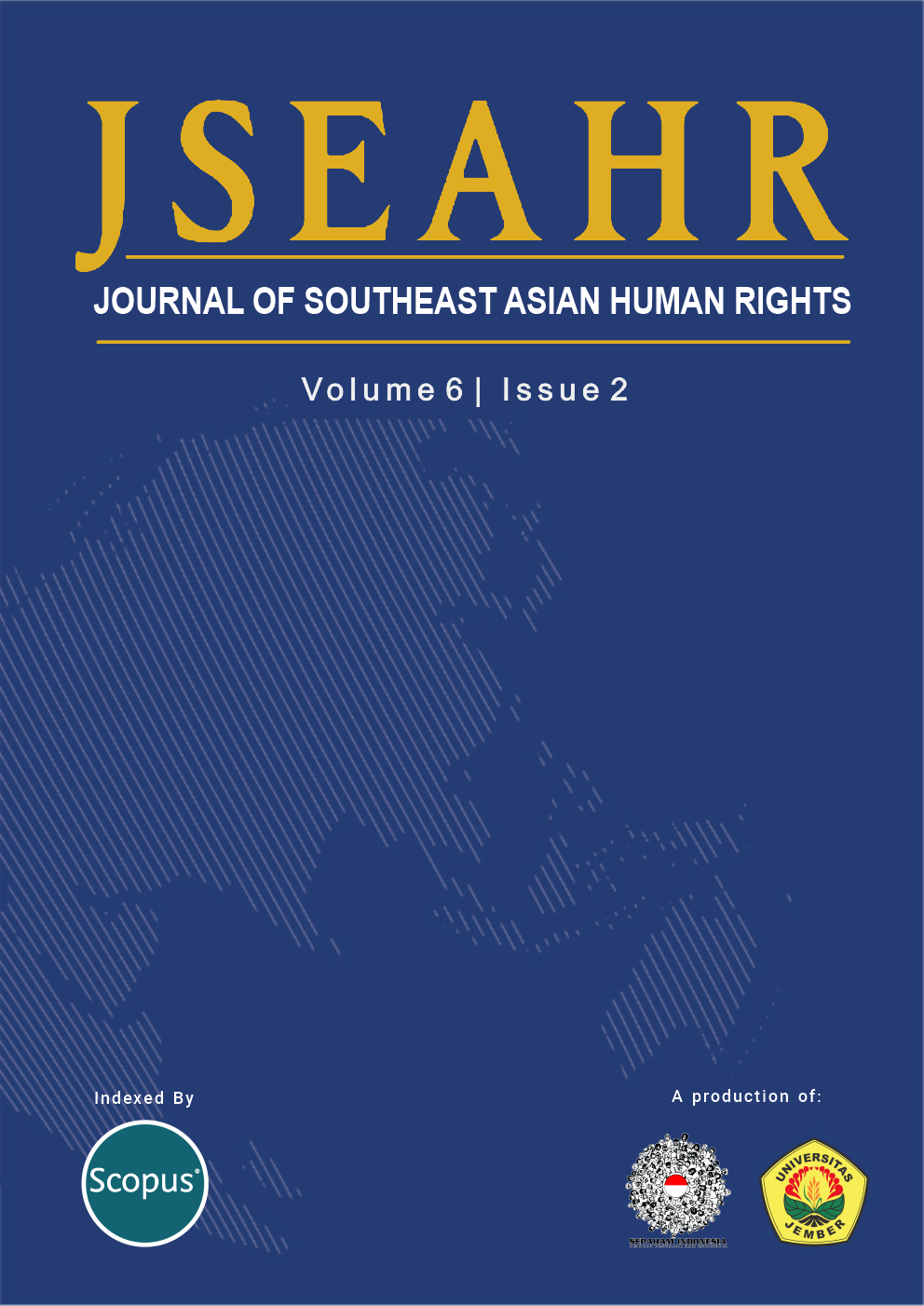Disruptions and Corporate Human Rights Responsibility
A Flashback to the COVID-19 Pandemic
DOI:
https://doi.org/10.19184/jseahr.v6i2.34526Keywords:
Corporate Human Rights due diligence, Disruptions, COVID-19, Pandemic, Bussiness dilemmaAbstract
This article aims to examine the question of how and to what extent business entities can balance the necessities of making business profits and performing social responsibilities in spite of various disruptions encountered in a pandemic. How and to what extent should their social and human rights responsibilities be managed during the COVID-19 pandemic or a similar crisis? The relevance of these questions arises from the fact that while the main purpose of business is to make profits while providing goods, services, jobs, and sources of income to many people, various disruptions arising from policy responses to the COVID-19 pandemic have been posing very serious challenges to business management practices, profitability, and sustainability. These challenges may force businesses to compromise on their social and human rights responsibilities to affected stakeholders for the sake of preserving their commercial responsibilities to their shareholders. This article argues that efforts to ensure effective performance for a balanced approach between commercial responsibilities and human rights responsibilities require a corporate organizational culture that takes human rights risks as seriously as commercial risks. This means there must be an organizational attitude that maintains an unwavering commitment to respect human rights while doing business. In practice, this organizational attitude should be manifested through a clear indicator of its commitment to both “know and “show†human rights responsibilities by way of embedding human rights policy and due diligence procedures into corporate culture.
Keywords: Corporate human rights due diligence, disruptions, COVID-19, Pandemic, Business dilemma
Downloads
References
Bhutta, M. et.all (2021), “Forced Labour in the Malaysian Medical Gloves Supply Chain before and during the COVID-19 Pandemic: Evidence, Scale and Solutionsâ€, Joint Research Report, Modern Slavery & Human Rights Policy and Evidence Centre.
Chua, J. M. (2021), “Fashion’s $40 Billion Cancellation Spree Leaves Suppliers Footing the Billâ€, Sourcing Journal, 14 December.
Corporate Human Rights Benchmark (2021), Covid-19 and human rights: Assessing the private sector’s response to the pandemic across five sectorsâ€, World Benchmarking Alliance, < https://assets.worldbenchmarkingalliance.org/app/uploads/2021/02/CHBR-Covid-Study_110221_FINAL.pdf > (Access 6/28/2022).
Dingel, J. I and Neiman, B. (2020), “How Many Jobs Can be Done at Homeâ€, Working Paper 26948, at <http://www.nber.org/papers/w26948> (Accessed 09/10/2022).
European Federation of Food Agriculture and Tourism Trade Union (2020), “Covid-19 outbreaks in slaughterhouses and meet processing plants: State of affairs and demands for action at EU levelâ€, EFFAT Report, 7 September.
Funk, J. (2021), “Government Data: At Least 59K Meat Plant Workers Caught COVID, 269 Diedâ€, Food Manufacturing Newsletter, 27 October.
Guiding Principles on Business and Human Rights: Implementing the United Nations ‘Protect, Respect and Remedy’ Framework, UN. Doc A/HRC/17/31 (21 March).
Institute for Human Rights and Business (2020), “Respecting Human Rights in the Time of the COVID-19 Pandemic: Examining Companies’ Responsibilities for Workers and Affected Communitiesâ€, pp. 5-6, at <https://www.ihrb.org/focus-areas/covid-19/report-respecting- human-rights-in-the-time-of-covid19> (Accessed 09/10/2022).
International Labour Organization (2020), “A global survey of enterprises: Managing the business disruptions of COVID-19: Second quarter 2020 situational analysisâ€, at <https://www.ilo.org/wcmsp5/groups/public/---ed_dialogue/---act_emp/documents/publication/wcms_760306.pdf> (Accessed 05/08/2022).
International Labor Organization and World Health Organization (2021), “Covid-19: Occupational Health and safety for Health Workersâ€, Interim Guidance (2 February) at < https://www.who.int/publications/i/item/WHO-2019-nCoV-HCW_advice-2021-1> (Accessed 10/10/2022).
International Labour Organization (2020), COVID-19 and the world of work:
Country policy responses†< https://www.ilo.org/global/topics/coronavirus/regional-country/country-responses/lang--en/index.htm> (Accessed 07/06/2022).
International Labour Organization (2020), “Recommendations for garment manufactures on how to address the Covid-19 pandemicâ€, ILO Report on Decent Work in the Garment Sector Supply chains in Asia, < https://www.ilo.org/wcmsp5/groups/public/---asia/---ro-bangkok/documents/briefingnote/wcms_741642.pdf >.
International Covenant on Civil and Political Rights, Art. 26, ICCPR Committee, General comment No. 18: Non-discrimination, Thirty seventh session (1989).
Jones, K. et al. (2021), Lock Down and In Limbo: The Global Impact of COVIG-19 on Migrant Worker Rights and Recruitmentâ€, Report prepared by REFRAME, Geneva: International Labor Organization Publication.
Khambay, A. & Narayanasamy, T. (2021), “Wage theft and pandemic profits: The right to a living wage for garment workersâ€, Business and Human Rights Resource Centre Report < https://media.business-humanrights.org/media/documents/Unpaid_wages_v9.pdf > (access 25/6/2022).
Koren, M. and PetÅ‘, R .(2020), “Business disruptions from social distancingâ€, PLoS ONE, 15(9).
Lloyd’s Register Foundation, (2020), “The Lloyd’s Register Foundation World Risk Poll: Full report and analysis of the 2019 poll†at <https://wrp.lrfoundation.org.uk> (Accessed 09/10/2022).
Ministry of Health, Labor and Welfare (2020), “Avoid the “Three Csâ€!: Important Notice to Prevent Covid-19 Outbreaksâ€, at < https://www.mhlw.go.jp/content/3CS.pdf> (Accessed 10/10/2022).
Ministry of Economy, Trade and Industry (2020), “Package of Measures for Supporting Businesses in Resuming their Business Operations Formulatedâ€, at <https://www.meti.go.jp/english/press/2020/0522_004.html> (Accessed 09/10/2022).
Reisdorff, K. S. et al. (2020), “Triaging Employee Refusals to Work Due to COVID-19: A Legal Update for Healthcare Employersâ€, at < https://ogletree.com/insights/triaging-employee-refusals-to-work-due-to-covid-19-a-legal-update-for-healthcare-employers/> (Accessed 09/10/2022).
Shift, Relinger, R. (2014), “Embedding the Corporate Responsibility to Respect Human Rights within Company Cultureâ€, New York: Shift.
Stabile, M., et al. (2020), “COVID-19, inequality, and gig economy workersâ€, VOXEU/CEPR Research-based policy analysis and commentary from leading economists, 01 April.
Touzenis, K. and Cholwinski, R. (2009), “Human Rights of Migrants – Editorial Introductionâ€, International Journal of Multicultural Society, 11(1).
United Nations, International Covenant on Economic, Social and Cultural Rights, General Assembly resolution 2200A (XXI), 16 December 1966.
Voss, H. (2020), “Implications of the COVID-19 Pandemic for Human Rights and Modern Slavery Vulnerabilities in Global Value Chainsâ€, Transnational Corporations, 27(2).
Storper, M. and Venables, A. J. (2004), “Buzz: Face-to-face contacts and the urban economyâ€, Journal of Economic Geography, 4(4).
Wilder-smith, A. and Freedman, D. O. (2020), “Isolation, quarantine, social distancing and community containment: pivotal role for old-style public health measures in the novel coronavirus (2019-nCoV) outbreakâ€, Journal of Travel Medicine, 27 (2).







